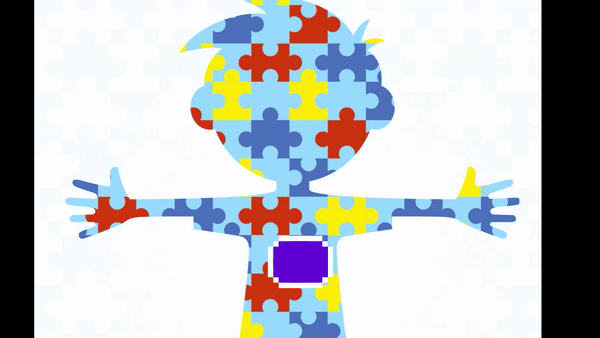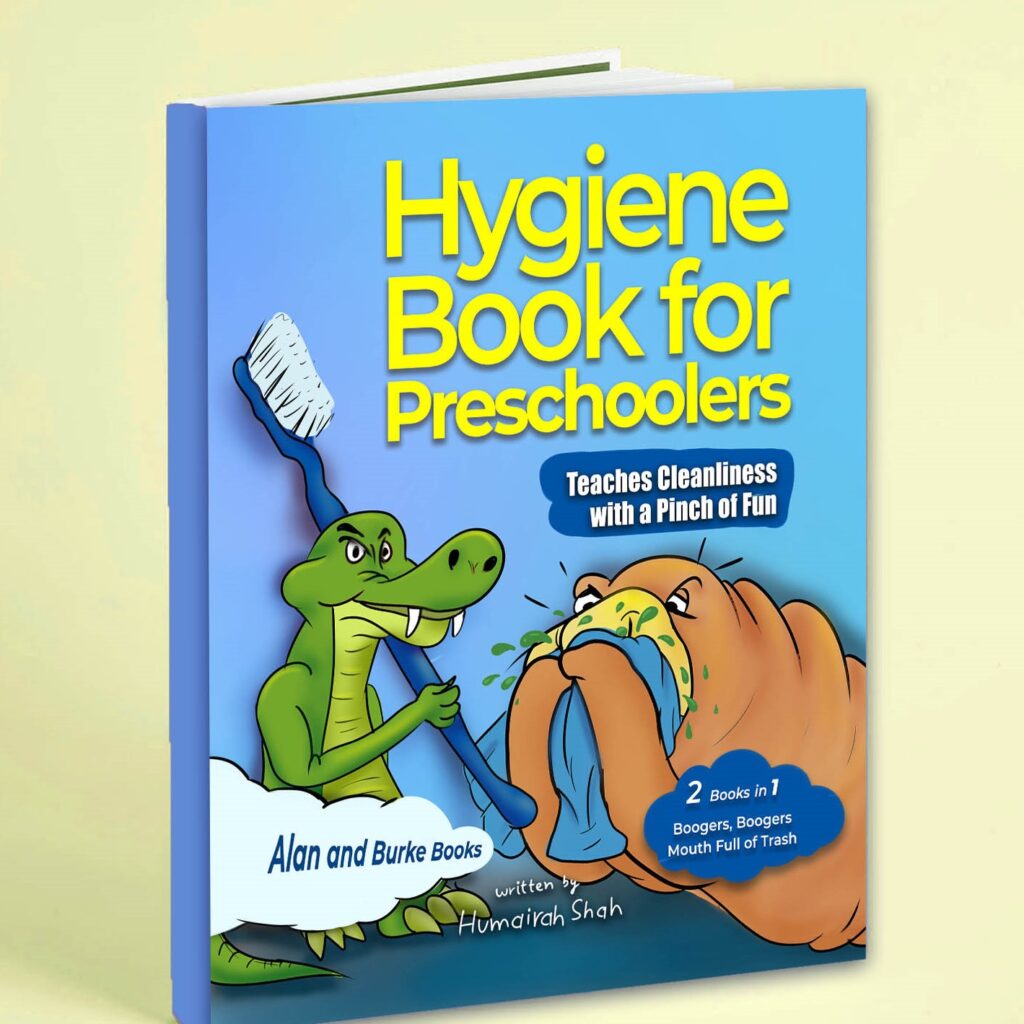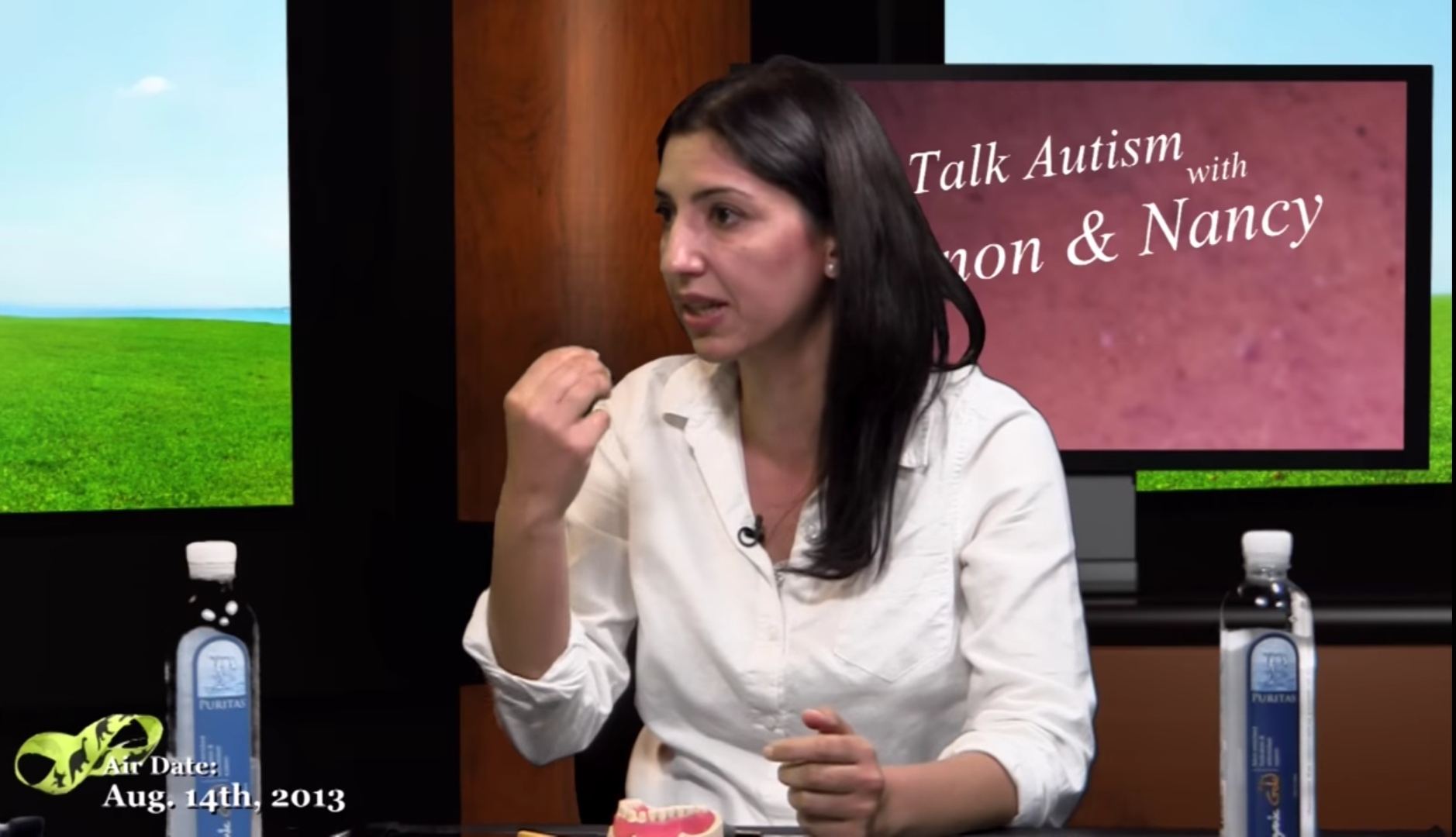Click on the Image to watch the video.
Nursing Bottle Syndrome (in Spanish)
Los Padres Alimentan Inadvertidamente El Dolor
Del Niño: Síndrome De La Botella De Enfermería

Como dentista, si te dijera que había una cosa que podrías hacer para salvar a tu niño o bebé de un
dolor insoportable, lo más probable es que te sientes y escuches. Sin embargo, este simple consejo es
ignorado por la mayoría de los papas.
El Síndrome de La Botella de Enfermería (NBS), también conocido como Síndrome de La Botella de Bebé,
afecta a niños menores de cinco años de edad. El NBS se produce cuando los dientes de leche tienen
contacto con líquidos que contienen azúcar como leche, fórmula o jugo durante un período prolongado
de tiempo. Causa una gran decadencia. En consecuencia, los niños de tan solo dos años terminan
necesitando empastes, coronas o extracciones.
Durante los últimos trece años, he visto un aumento dramático en los niños pequeños que vienen para
estos procedimientos y como dentista profesional, es insoportablemente doloroso. Y pensar que
intercambiar el agua por leche, fórmula o jugo en biberones es una solución preventiva y a menudo es
simplemente ignorada.
¿Hemos Fracasado Como Médicos?
Cada paciente con NBS cuesta a Medicare hasta $2000, si no más. La mayoría de mis pacientes con NBS
son niños de menos de cinco años. Los he visto sufrir y sus padres lloran mientras se someten al
tratamiento. Imagina el resultado si canalizamos este dinero para educar a los padres y a los niños sobre
este tema ignorado. Con la maternidad adolescente en aumento, educar a los padres debería ser una
prioridad para nuestros medios de comunicación y gobierno. Me convertí en madre a la edad de 35 años
y no fue fácil; seguramente para madres adolescentes, la crianza es aún más difícil.
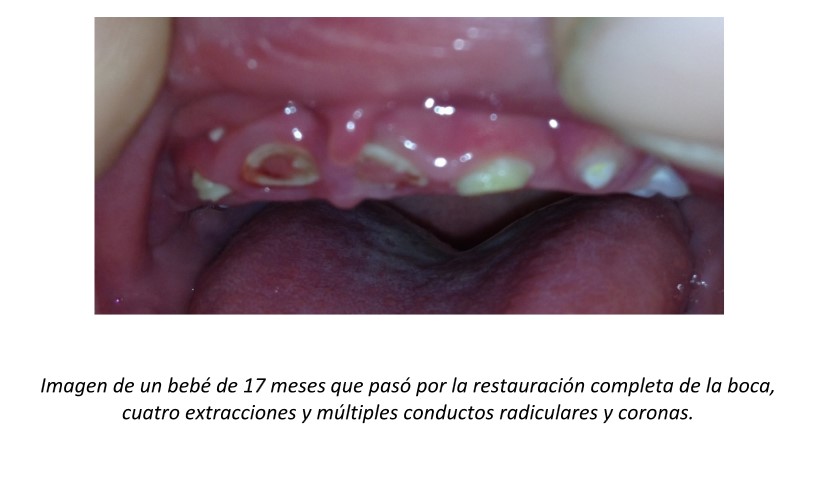
La Solución está a la Mano
Cuando los niños se duermen mientras tienen el biberón o mientras amamantan, la leche permanece en
su boca toda la noche. Las bacterias presentes en la boca descomponen el azúcar en ácido, causando
caries dental.
¿Significa esto que no debemos amamantar? La lactancia materna es ideal para un niño, pero después
de su primer cumpleaños, ten una botella de agua lista para cambiar después de la alimentación, para
que cualquier leche residual o fórmula se enjuague. Intenta reducir gradualmente la frecuencia con la
que alimentas a tu bebe por la noche. Los padres apresurados también usan una botella llena de leche o
jugo como chupete. Otros diluyen el jugo con agua en una taza con boquilla. Otros todavía les dan
golosinas azucaradas a sus hijos. Como resultado, hay un flujo constante de azúcar en contacto con los
dientes, dando a las bacterias mucho tiempo para causar caries.
Consejos para Prevenir el NBS
Desteta a los niños de la botella tan pronto como 12-14 meses. Nunca dejes que tu hijo camine con un
biberón lleno de leche durante más de 20 minutos. Comienza a cepillar los dientes de tu hijo tan pronto
como aparezcan los dientes, o límpialos con un paño húmedo. Los exámenes dentales deben comenzar
a los 12 meses o antes, si se observa un problema. Los jugos y refrescos causan erosión de los dientes y
deben evitarse. 4oz es la cantidad máxima de jugo que un niño debe consumir en un día. Los niños
deben ser alimentados cada 2-3 horas. Un horario típico podría ser el desayuno a las 8:00 am, merienda
a las 10:00 am, almuerzo a las 12:00 pm y así sucesivamente. El agua es lo único que deben consumir
entre las comidas.
Los dientes sanos comienzan jóvenes y unos pocos pasos simples pueden evitar consecuencias muy
dolorosas. En la vida, nunca es demasiado pronto para comenzar un hábito saludable.
All you Need to Know About your Child’s Teeth
All you Need to Know About your Child’s Teeth: A Healthy Baby is a Happy Baby
Whether you’re a parent in the US or anywhere else in the world, raising your first child is
invariably a steep learning curve. With so much on our plates, it’s easy for parents to
overlook caring for baby’s teeth, but a few useful tips will keep us on track.

Whether you’re a parent in the US or anywhere else in the world, raising your
first child is invariably a steep learning curve. With so much on our plates, it’s
easy for parents to overlook caring for baby’s teeth, but a few useful tips will
keep us on track.
Aww…the First Tooth
A baby’s first tooth erupts between four to eight months of age and typically by
the time he or she is two-and-a-half to three-years old, every baby tooth
should have erupted. Some children have a difficult time during teething,
while others sprout teeth effortlessly. When babies are teething, they tend to
be droolers and often refuse to eat because their gums hurt. Excessive drooling
can irritate skin around the mouth causing rashes. Babies can become restless
and fussy; the pain even keeps some from sleeping well. Tiny hands in the
mouth and a willingness to bite on everything are sure signs of the baby being
uncomfortable. You may even find them rubbing their cheeks to deal with the
discomfort associated with teeth erupting at the back of their mouth.
What Should Parents Do?
Massage baby’s gums with your finger or damp gauze. Keep the area clean, use
a soft toothbrush and use teething rings. Chilled teethers are the way to go. Do
not freeze the teether. Cold carrots are good substitutes if your baby can chew
on solid food. To prevent skin rashes caused by excessive drooling, dab dry
their chin regularly.
Tooth Care Starts Early
Start cleaning baby teeth and gums as soon as they erupt. Use damp gauze to
clean them when they are just peeking and graduate to a soft tooth brush once
they have erupted. Brush twice a day and floss once. Stick flossers are ideal for
babies. Use safe-to-swallow, no-fluoride training toothpaste until your child
turns one. After their first birthday graduate to a fluoridated tooth paste, use a
smear layer till the age of three and pea size after.
Save Your Child from a Nightmare: Nursing Bottle Syndrome
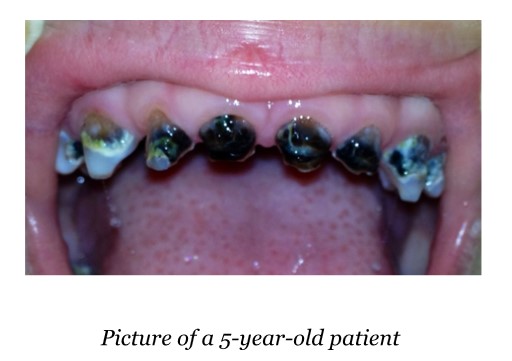
Nursing Bottle Syndrome (NBS), also known as Baby Bottle Syndrome, affects
children less than five years of age. NBS is caused when baby teeth have
prolonged contact with liquids containing sugar such as milk, formula or juice,
resulting in extensive decay. I frequently see children as young as two years
old who need fillings, crowns or extractions.
What’s to be done? Wean babies from the bottle around 12-14 months. Never
let your child walk around with a bottle filled with milk for more than 20
minutes. When children fall asleep while having a bottle or breastfeeding, they
generally don’t swallow the last part of the milk and that remains in their
mouth all night long. Bacteria present in the mouth breaks sugar down into
acid causing tooth decay. Breastfeeding is great for children but after their
first birthday, have a bottle of water ready to swap after feeding so that any
residual milk or formula is rinsed down. Aim to gradually reduce the
frequency with which you feed at night.
Juices and sodas cause erosion of teeth and should be avoided. 4oz is the
maximum amount of juice a child should consume in a day. Limit sticky
snacks to once a day. Children should be fed every 2-3 hours. A typical
schedule could be breakfast at 8:00 am, snack at 10:00 am, lunch at 12:00 pm
and so forth. Water is the only thing they should be consuming between the
meals. Also, dental examinations should begin at 12 months.
Here Comes the Tooth Fairy
Time does go by fast and before long, your six or seven-year-olds will come
and tell you that their teeth are loose. Some may start losing their baby teeth a
year earlier or later. Often, kids avoid brushing around loose teeth, so it is
important to help them keep those areas clean.
Over retained lower anteriors
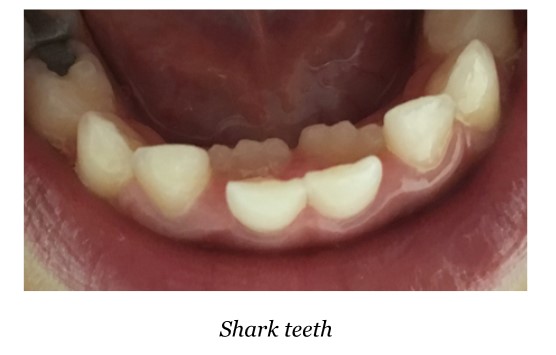
Baby teeth usually fall out on their own. However, in some cases they can
stubbornly stick around even after permanent teeth have erupted. Often, this
happens with lower front teeth, resulting in ‘shark teeth’. The permanent teeth
grow behind the over-retained baby teeth. If the baby teeth are loose, they will
fall out in a week or two and the tongue will push the permanent teeth
forward. Sometimes the roots of baby teeth don’t get resorbed; in that case,
they might need to be extracted by a dentist. ‘Shark Teeth’ in upper arch often
needs to be extracted and might not be a self-correcting issue. If neglected, it
can require orthodontic intervention in the future.
The Six-Year Molar
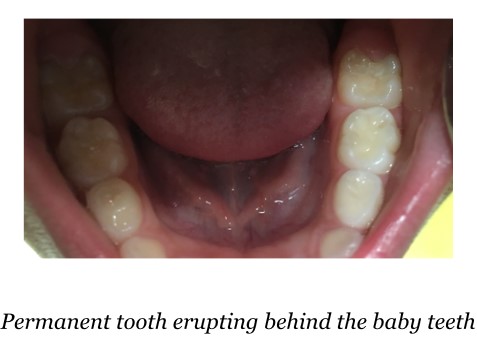
Another important development is the appearance of the first permanent
molar, also called six-year molar. This is a very important tooth that erupts
behind the baby teeth. The jaw grows to accommodate the molar.
Children aren’t used to having a tooth so far behind in their mouths and can
inadvertently skip brushing them. Given how big a tooth this is, it can cause
considerable pain if it gets infected with food collecting around it. Salt water
gargle, brushing and massaging the area will help ease the discomfort. As soon
as the six year molar makes an appearance, it needs to be sealed. Sealant is
like a nail polish coat that goes on top surface of the molar. It prevents food
from collecting in groves and helps reduce the incidence of cavities.
Yes, dental care starts young. The better and more regular the care, the
smaller your future dentist and orthodontic bills!
Nursing Bottle Syndrome

As a dentist, if I were to tell you that there was one thing you could do to save your toddler or baby from
excruciating pain, chances are you would sit up and listen. And yet, this simple advice flies below the
radar for so many parents.
Nursing Bottle Syndrome (NBS), also known as Baby Bottle Syndrome, affects children less than five
years of age. NBS is caused when baby teeth have contact with liquids containing sugar such as milk,
formula or juice for an extended period of time. It causes extensive decay. Consequently, children as
young as two years end up needing fillings, crowns or extractions.
For the last thirteen years, I have seen a dramatic spike in toddlers coming in for these procedures and
as a professional dentist, it is unbearably painful. And to think that swapping water for either milk,
formula or juice in baby bottles is a preemptive solution is so often tossed to the side.
Have We as Doctors Failed?
Most of my NBS patients are children who are less than five years old. I have seen them suffer and their
parents cry as they undergo treatment. Imagine the result if we channeled all the resources to educate
parents and children about this under-addressed issue. Educating parents should be a priority for our
media and government. I became a mother at the age of 35 and it was not easy; surely young mothers
must find parenting even more challenging than I did.
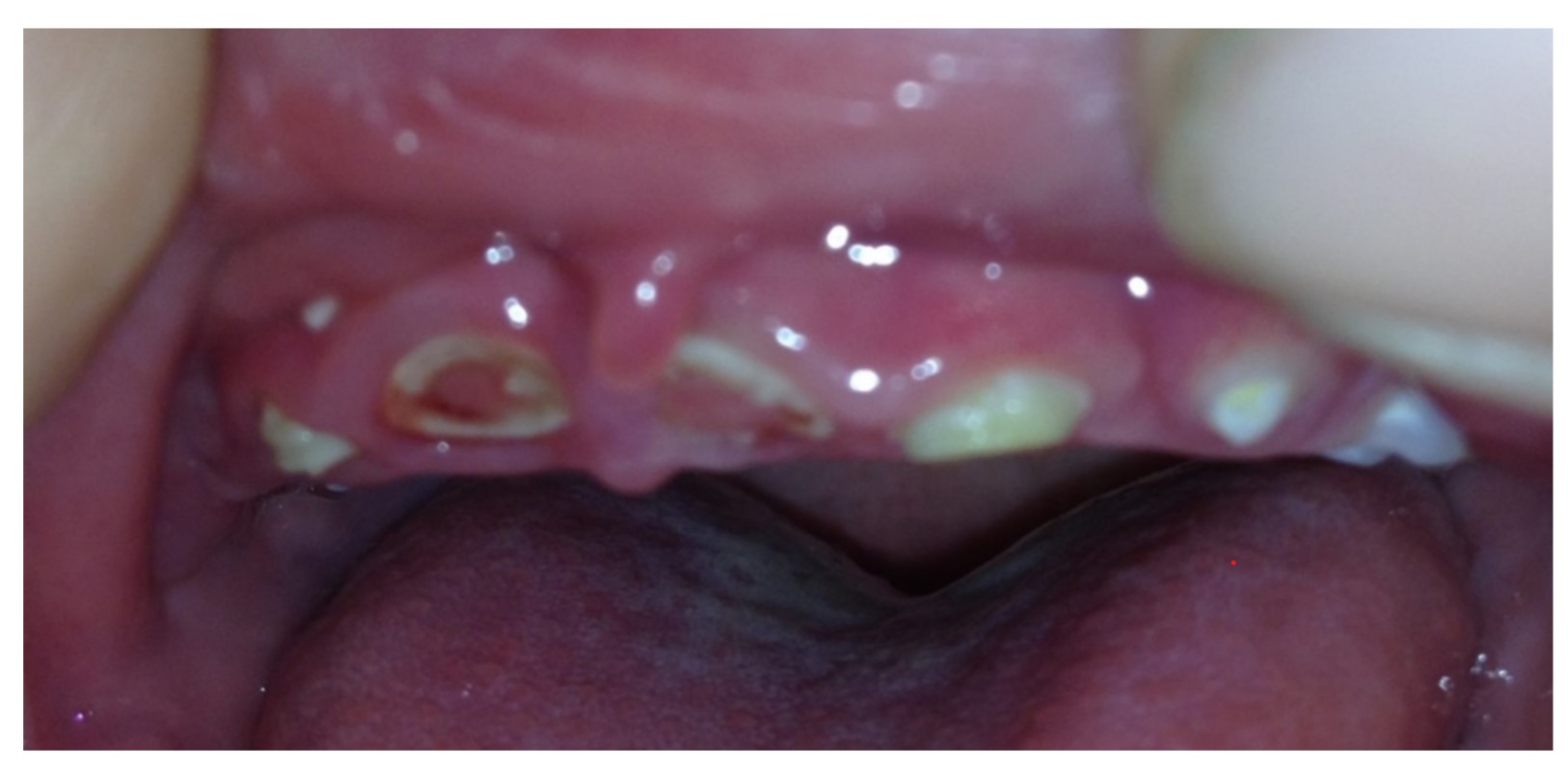
The Solution is at Hand
When children fall asleep while having the bottle or while breast feeding, the milk remains in their
mouth all night long. Bacteria present in the mouth breaks sugar down into acid, causing tooth decay.
Does this mean we should not breastfeed? Breastfeeding is great for a child but after their first birthday,
have a bottle of water ready to swap after feeding, so any residual milk or formula is rinsed down. Aim
to gradually reduce the frequency with which you feed at night.
Harried parents also use a bottle filled with milk or juice as a pacifier. Others dilute juice with water in a
sippy cup. Still others ply their children with sugary snacks. As a result, there is a steady stream of sugar
in contact with the teeth, giving bacteria lot of time to cause cavities.
Tips to Prevent NBS
Wean children from the bottle as early as 12-14 months.
Never let your child walk around with a bottle filled with milk for more than 20 minutes.
Begin brushing your child’s teeth as soon as teeth appear, or clean them using a wet cloth. Use safe to
swallow tooth paste till they turn one. After their first birthday graduate to fluoridated tooth paste,
smear layer till they turn three years old and pea size after.
Dental examinations should begin at 12 months or earlier, if a problem is noted.
Juices and sodas cause erosion of teeth and should be avoided. 4oz is the maximum amount of juice a
child should consume in a day.
Children should be fed every 2-3 hours. A typical schedule could be breakfast at 8:00 am, snack at 10:00
am, lunch at 12:00 pm and so forth. Water is the only thing they should be consuming between the
meals.
Healthy teeth start young and a few simple steps can avert very painful consequences. In life, it is never
too early to start a healthy habit.
Dental Tips for Children with Special Needs
Dental Tips for Children with Special Needs from Dentist & Author Dr. Humairah Shah.
https://kashmir.today/article-just-another-girl-from-buchpora-and-a-very-average-student/
